TaskUs Bundle
How Did TaskUs Rise to Digital Dominance?
In the dynamic world of outsourced services, understanding the journey of industry leaders like TaskUs is crucial. TaskUs, a key player since 2008, has transformed from a virtual assistant service into a global powerhouse. This evolution reflects not only the company's strategic vision but also the broader shifts in how businesses operate and engage with their customers.
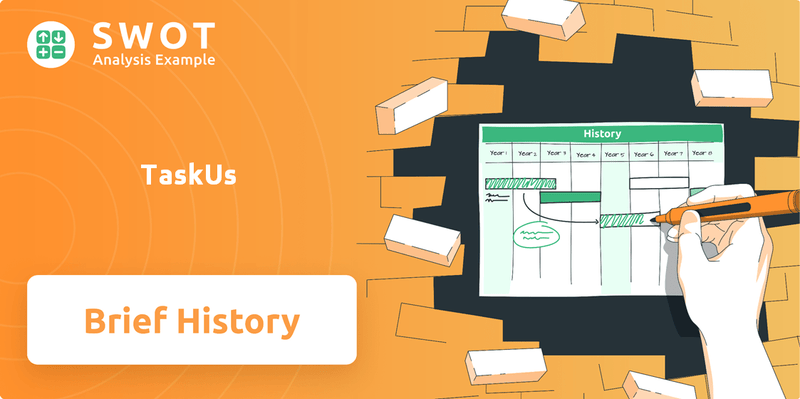
From its inception in Santa Monica by Bryce Maddock and Jaspar Weir, the TaskUs SWOT Analysis reveals a story of adaptability and growth. Today, the TaskUs company serves approximately 200 clients, achieving a record revenue of $995 million in 2024. The TaskUs history showcases its impact on sectors like social media and e-commerce, highlighting its commitment to providing next-generation customer experience.
What is the TaskUs Founding Story?
The story of TaskUs, a prominent player in the business services sector, began in 2008. The company was the brainchild of Bryce Maddock and Jaspar Weir, who, with a combined investment of $20,000, set out to create a virtual personal assistant service.
Their initial concept was simple: provide busy professionals with a team to handle their tasks. Maddock and Weir chose the Philippines as their operational base, starting with a small team and a single-room office in Bacoor, Cavite. This marked the beginning of what would become a significant outsourcing and customer experience provider.
The early days of TaskUs involved a shift in focus, moving from a task-based virtual assistant platform to a comprehensive outsourcing business. This evolution was driven by client needs and a commitment to quality. The company quickly gained recognition for its service quality and people-first culture, setting the stage for its future growth.
TaskUs was founded in 2008 by Bryce Maddock and Jaspar Weir, who invested $20,000 to launch a virtual B2C personal assistant company. The company initially provided virtual personal assistant services, aiming to support professionals with various tasks.
- TaskUs started with five employees in a single-room office in the Philippines.
- The company pivoted from a task-based model to a more comprehensive outsourcing approach.
- Early funding included $15 million from Navegar and a $14 million loan from Bridge Bank.
- The company's early growth involved outsourcing to 16 different countries to understand client expectations better.
The Target Market of TaskUs has evolved significantly since its inception. The company's early focus on virtual assistant services quickly expanded into providing comprehensive outsourcing solutions for businesses. This shift was driven by the need to offer more extensive support to clients, leading to the development of services such as customer service, content moderation, and other specialized functions.
Early funding was crucial for TaskUs's expansion. Navegar, a private equity fund based in the Philippines, provided $15 million, while Bridge Bank offered a $14 million loan. These investments supported the company's growth and helped it scale its operations. The company's early approach involved outsourcing to various countries to understand client expectations better. This trial-and-error approach allowed TaskUs to refine its service delivery and ensure it met the needs of its clients.
TaskUs's early days were marked by a focus on quality and a people-first culture. This approach helped the company build a strong reputation and attract and retain clients. TaskUs's commitment to its employees and its focus on providing excellent service have been key factors in its success. By focusing on these aspects, TaskUs was able to establish itself as a leader in the outsourcing industry.
TaskUs SWOT Analysis
- Complete SWOT Breakdown
- Fully Customizable
- Editable in Excel & Word
- Professional Formatting
- Investor-Ready Format
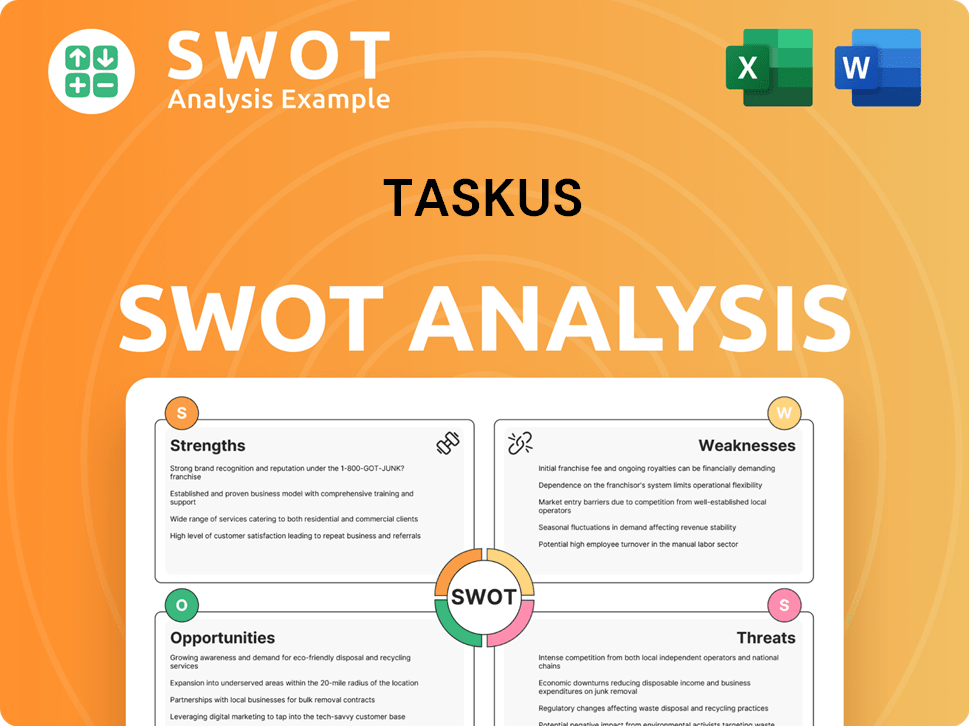
What Drove the Early Growth of TaskUs?
The early growth of the TaskUs company saw a rapid transformation from a virtual personal assistant service to a comprehensive digital services provider. This evolution included expanding its business model to offer customer experience and content management services. This strategic shift was crucial for meeting the holistic needs of tech-enabled businesses.
TaskUs secured major clients early on, including Tinder, Whisper, Uber (starting in 2013), Coinbase (starting in 2017), Netflix, and Zoom (starting in 2020). These partnerships significantly fueled the company's expansion. The company's ability to attract and retain high-profile clients was a key driver of its early success and growth.
By 2014, TaskUs's revenue reached $15 million, a significant increase from $6 million the previous year, demonstrating rapid growth. The workforce also expanded, with the company employing 1,500 individuals across its Santa Monica and Philippines offices by 2014. This growth reflected the company's ability to scale its operations to meet increasing demand.
A pivotal moment came in 2018 when Blackstone invested $250 million, providing resources for further expansion. In 2021, TaskUs became a publicly listed company on Nasdaq, marking a major milestone. This public listing further solidified its market position and provided access to capital for continued growth.
The company expanded its global presence, with operations in 28 locations across 12 countries. As of December 31, 2024, TaskUs had a worldwide headcount of approximately 59,000 people. This global expansion allowed TaskUs to serve a broader client base and adapt to the evolving demands of its high-growth clients.
TaskUs PESTLE Analysis
- Covers All 6 PESTLE Categories
- No Research Needed – Save Hours of Work
- Built by Experts, Trusted by Consultants
- Instant Download, Ready to Use
- 100% Editable, Fully Customizable
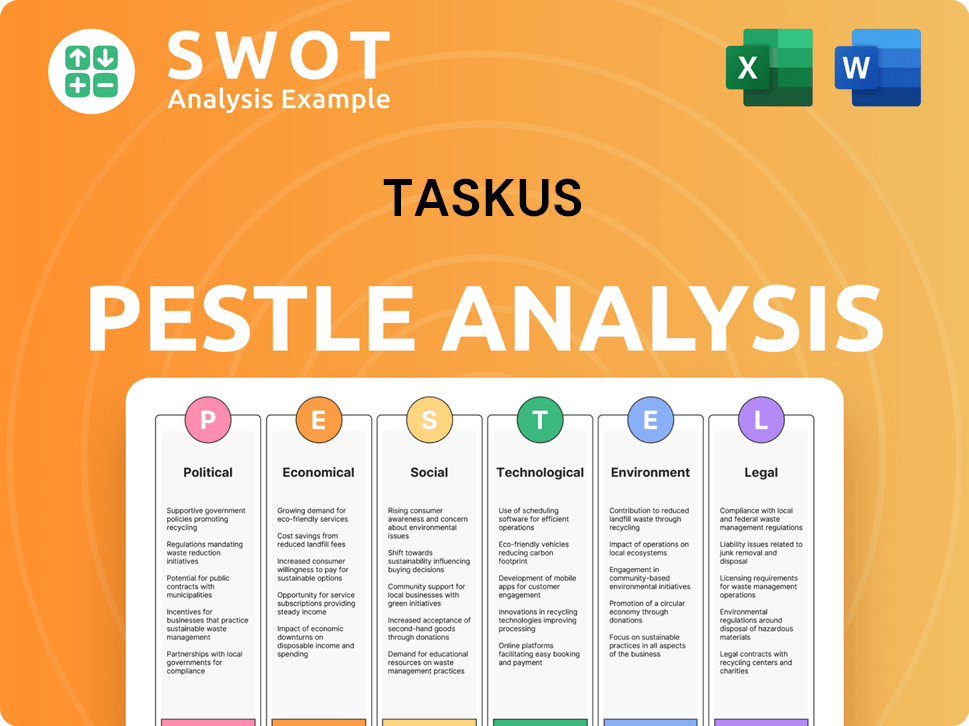
What are the key Milestones in TaskUs history?
The TaskUs company has achieved significant milestones since its inception, marking its evolution and impact within the outsourcing industry. The company's journey reflects its strategic adaptations and commitment to innovation.
| Year | Milestone |
|---|---|
| Early Days | The company transitioned from a virtual personal assistant model to a broader outsourcing provider, focusing on critical business functions. |
| Ongoing | The company has been consistently listed among Inc.'s fastest-growing companies in America for six consecutive years. |
| January 2025 | Named a Major Contender in Everest Group's B2B Sales Services PEAK Matrix® 2024. |
| April 2025 | Recognized as a Leader in Everest Group's Trust and Safety Services PEAK Matrix® Assessment 2025 for the third consecutive year. |
| 2024 | Named a Leader in Everest Group's Financial Crime and Compliance PEAK Matrix® Assessment and Data Annotation and Labeling Solutions for AI/ML PEAK Matrix® Assessment. |
| 2023 | Launched its proprietary generative AI platform, TaskGPT. |
| April 2025 | TaskGPT earned ISO 31700 certification. |
The company innovatively shifted from a virtual personal assistant model to a comprehensive outsourcing provider. This strategic pivot allowed it to offer a wider range of services.
The company's 'people-first' culture has been a key differentiator, influencing client selection and employee development. This culture has helped in attracting and retaining talent.
The launch of TaskGPT in 2023 marked a significant step into generative AI. This platform enhances service capabilities.
TaskGPT's ISO 31700 certification in April 2025 highlights its commitment to responsible AI. This certification reinforces its dedication to ethical AI practices.
In 2022, the company faced a class-action lawsuit related to a data breach. Several components of the claim were dismissed in February 2023.
The company experienced margin pressures, with Q4 2024's adjusted EBITDA margin falling to 19.6%. This was due to growth-related investments and security incident costs.
The company has diversified into countercyclical sectors like healthcare and traditional banking. This strategic move anticipates growth in these areas by 2025.
TaskUs Business Model Canvas
- Complete 9-Block Business Model Canvas
- Effortlessly Communicate Your Business Strategy
- Investor-Ready BMC Format
- 100% Editable and Customizable
- Clear and Structured Layout
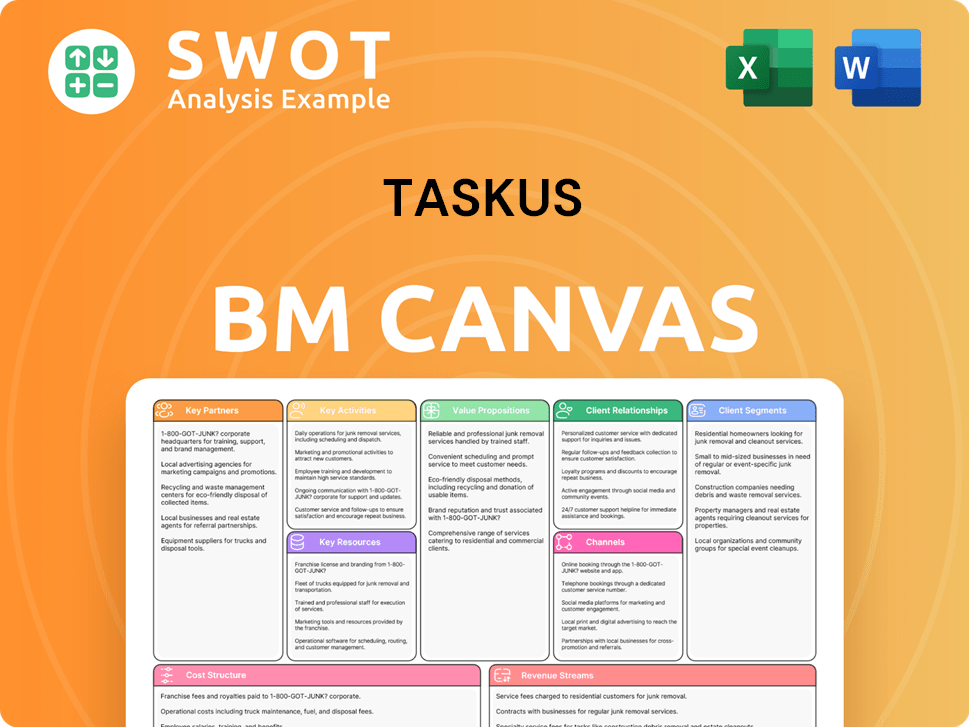
What is the Timeline of Key Events for TaskUs?
The TaskUs company, founded by Bryce Maddock and Jaspar Weir, has a history marked by significant growth and strategic shifts, evolving from a virtual assistant service to a major player in the customer experience and digital services industry. Here's a look at the key milestones in the TaskUs history.
| Year | Key Event |
|---|---|
| 2008 | Founded in Santa Monica, California, as a virtual B2C personal assistant company. |
| 2013 | Began providing services to Uber. |
| 2014 | Revenue reached $15 million. |
| 2017 | Began providing services to Coinbase; moved headquarters to San Antonio, Texas. |
| 2018 | Blackstone invested $250 million; moved headquarters to New Braunfels, Texas. |
| 2020 | Began providing services to Zoom. |
| 2021 | Became a publicly listed company on Nasdaq. |
| 2022 | Made its first acquisition, heloo; a class-action lawsuit was filed regarding a data breach. |
| 2023 | Introduced TaskGPT, an AI platform. |
| Q3 2024 | Reported record revenue of $255.3 million, a 13.2% increase year-over-year. |
| Q4 2024 | Reported record revenue of $274.2 million, a 17.1% year-over-year growth; full-year 2024 revenue reached $995 million. |
| January 2025 | Named a Major Contender in Everest Group's B2B Sales Services PEAK Matrix® 2024. |
| April 2025 | TaskGPT earned ISO 31700 certification; recognized as a Leader in Everest Group's Trust and Safety Services PEAK Matrix® Assessment 2025 for the third consecutive year. |
| May 2025 | Announced strategic partnerships with Decagon and Regal to further transform customer experience with agentic AI. |
TaskUs is heavily focused on its pivot to AI services. This shift is expected to be the fastest-growing segment. The company anticipates that AI will contribute 20–30% of total revenue growth in 2025. This strategic move aims to capitalize on the growing demand for AI-driven solutions in customer experience.
The company aims to sustain double-digit growth rates. Projections for full-year 2025 revenue are between $1.095 billion and $1.125 billion. The adjusted EBITDA margin is targeted at approximately 21%. These financial targets reflect the company's confidence in its growth trajectory.
TaskUs is investing in employee upskill training to couple higher-value services with AI solutions. The company is expanding its client base, with 55% of Q4 2024 signings coming from new clients. These initiatives are designed to enhance service offerings and attract new business opportunities.
The Agentic AI practice aims to partner with tech firms to automate customer support. Internally, TaskGPT is being rolled out to streamline HR and training functions. These technological advancements are central to the company’s strategy to improve efficiency and enhance service delivery.
TaskUs Porter's Five Forces Analysis
- Covers All 5 Competitive Forces in Detail
- Structured for Consultants, Students, and Founders
- 100% Editable in Microsoft Word & Excel
- Instant Digital Download – Use Immediately
- Compatible with Mac & PC – Fully Unlocked
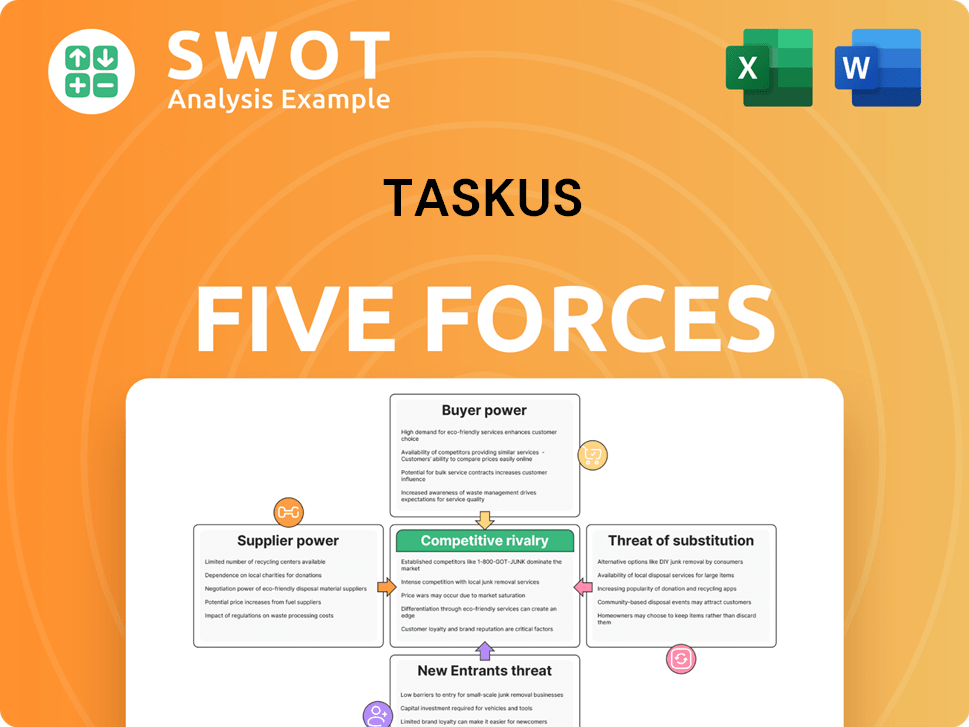
Related Blogs
- What is Competitive Landscape of TaskUs Company?
- What is Growth Strategy and Future Prospects of TaskUs Company?
- How Does TaskUs Company Work?
- What is Sales and Marketing Strategy of TaskUs Company?
- What is Brief History of TaskUs Company?
- Who Owns TaskUs Company?
- What is Customer Demographics and Target Market of TaskUs Company?
Disclaimer
All information, articles, and product details provided on this website are for general informational and educational purposes only. We do not claim any ownership over, nor do we intend to infringe upon, any trademarks, copyrights, logos, brand names, or other intellectual property mentioned or depicted on this site. Such intellectual property remains the property of its respective owners, and any references here are made solely for identification or informational purposes, without implying any affiliation, endorsement, or partnership.
We make no representations or warranties, express or implied, regarding the accuracy, completeness, or suitability of any content or products presented. Nothing on this website should be construed as legal, tax, investment, financial, medical, or other professional advice. In addition, no part of this site—including articles or product references—constitutes a solicitation, recommendation, endorsement, advertisement, or offer to buy or sell any securities, franchises, or other financial instruments, particularly in jurisdictions where such activity would be unlawful.
All content is of a general nature and may not address the specific circumstances of any individual or entity. It is not a substitute for professional advice or services. Any actions you take based on the information provided here are strictly at your own risk. You accept full responsibility for any decisions or outcomes arising from your use of this website and agree to release us from any liability in connection with your use of, or reliance upon, the content or products found herein.